North Korea conducted its last nuclear test in September 2017, and the test site is still experiencing troubling seismic activity, according to the Comprehensive Nuclear-Test-Ban Treaty Organization.
North Korea tested a suspected staged thermonuclear bomb with an explosive yield far greater than anything the country had previously tested on September 3, 2017. The test triggered landslides and earthquakes that physically altered the terrain at the Punggye-ri Nuclear Test Site. Since that test, the test site has experienced a total of nine aftershocks.
Two small aftershocks with magnitudes of 2.0 and 2.4 were detected within 15 miles of the test site on April 22, the Comprehensive Nuclear-Test-Ban Treaty Organization revealed Tuesday.
Continued tremors at the Punggye-ri test site have led some observers to conclude that North Korea’s nuclear test site is unstable and no longer suitable for weapons testing, which some suspect may be the reason behind North Korean leader Kim Jong Un’s sudden decision to close the Punggye-ri testing site.
“The nuclear test and the intercontinental ballistic missile test will be discontinued,” the state-run Korean Central News Agency (KCNA) reported Saturday, relaying a message from Kim. “North Korea’s nuclear test center will be discarded in order to ensure the transparency of the suspension of the nuclear test.”
Other Korea watchers, however, argue that the closing of the test site was an easy concession ahead of summits with South Korean and American leadership, especially considering the North’s claims that it has completed its state nuclear force, potentially eliminating the need for additional nuclear testing.
“North Korea’s Punggye-ri Nuclear Test Site, where North Korea has conducted six acknowledged underground detonations is still, as far as we can tell, fully operational,” 38 North scholars reported Monday. The North portal at Punggye-ri may have been damaged, however, leading to its abandonment, the West and South portals are presumably suitable for continued testing.
The closing of the nuclear test site was welcomed by both Washington and Seoul. Both expect North Korea to pursue total denuclearization. North Korean state media, however, paints a picture of a North Korea eager to be acknowledged as a normal nuclear weapons state.
“We will never use nuclear weapons unless there is a nuclear threat or nuclear provocation to our country, and in any case, we will not transfer nuclear weapons and nuclear technology,” KCNA reported Saturday. Many observers are suspicious of North Korea’s claims that it is open to denuclearizing the Korean Peninsula, asserting that Kim may be duping President Donald Trump.
The Trump administration made clear Monday that the White House is not “naive” when it comes to North Korea and its tendency to deceive.
Send tips to ryan@
All content created by the Daily Caller News Foundation, an independent and nonpartisan newswire service, is available without charge to any legitimate news publisher that can provide a large audience. All republished articles must include our logo, our reporter’s byline and their DCNF affiliation. For any questions about our guidelines or partnering with us, please contact licensing@dailycallernewsfoundation.org.


